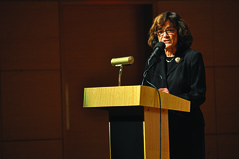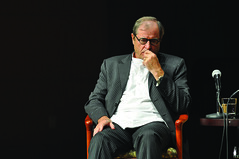RPCV Writers Write The World
This article comes from UNLV’s Rebel Yell —
American authors travel, write the world
October 18, 2010
by Ian Whitaker
Fifty years ago on Oct. 14, 1960, President John F. Kennedy laid the foundation for what would eventually become the Peace Corps.
In celebration of the occasion, the Black Mountain Institute hosted their latest gathering on Thursday at the Doc Rando Recital Hall in Beam Music Center, with a panel of internationally recognized American writers.
The topic for the night was “Writing the World: American Authors Looking Outward.”
Headlining the event were writers Mary-Ann Tirone Smith, Peter Hessler, and Paul Theroux.
The panelists were all former Peace Corps volunteers, born and raised in the United States, who developed their approach to life and writing through their experiences abroad.
Writer and former Peace Corps volunteer Marnie Mueller moderated the discussion.
Hessler, who taught English in China during the 1990s and later worked as the Beijing correspondent for the New Yorker, met the citizens of rural areas at a time when many Chinese were moving to the city in order to start businesses and seek better lives.
“Culture plays through regular people,” he said, describing his experiences travelling by Jeep Cherokee through China and picking up hitchhikers, mostly migrant workers and women who worked in factories. He said he didn’t go into the Peace Corps with the idea of becoming a writer, but the experience became the most important part of his education as an author, he said.
Mary-Ann Tirone Smith served in Cameroon in the 1960s, after being trained at Columbia University. “Writing had become my refuge by then,” she said.
And even though she had already started writing by the time she joined, she said that her time in Cameroon had profound effect on her.
“The greatest thing I got, as a writer, was the exposure to different languages,” she said. “I knew I could write about anything I wanted to.”
Theroux described his life growing up in the tumult of the 1960s, which affected him as a student.
“I was an angry student,” he said, “and a very agitated young man.”
After his time at the University of Massachusetts, Amherst, he volunteered for the Peace Corps and was sent to Malawi.
While teaching English there, he came in frequent contact with local villagers, some of whom had been old enough to remember the turn of the 20th century and who had a vivid recollection of uprisings and the history of their country.
He said that this had an effect on him as a writer and changed his perspective on the world. “I was able to better understand America from the viewpoint [of] another country,” he said.
A recurring theme during the evening was the deep impression that the Peace Corps left on the speakers’ lives.
They said that the Peace Corps is less about giving and more about what is taken away.
“Being in the Peace Corps shows you the limitations of philanthropy and education,” Theroux said. “[In Malawi], the Peace Corps practically was the school system.”
Smith said her time in Cameroon made her the writer she has become. “The Peace Corps gave me the tools to write,” she said.
All three of the speakers later went on to become accomplished authors in their own right. As the platform was opened up to include the audience, some writers in the crowd asked for advice.
Mueller advised them to listen, saying that the whole world opens up to those who do.
“Look for the story beneath the story,” Smith said, emphasizing the importance to aspiring writers of delving underneath the commonplace.
“Go away. Leave home,” Theroux said. “Coming home from abroad, you’ll find that you can’t explain it to people. Their eyes glaze over. That’s why we become writers.”
Theroux said that he had to leave the world he thought he knew to find the one that truly exists. “The world was elsewhere,” he said, “and I found it among thatched roofs and children riding bicycles.”
But Theroux also said that there is another way for aspiring writers to discover the world.
“You have to read and you have to make an inner journey as well,” he said, closing the evening. “Where you end up is of no importance.”


No comments yet.
Add your comment